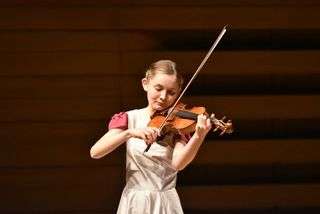|
Back
“Remarkable” is the only word Toronto
Koerner Hall
04/13/2018 -
Alma Deutscher: Sonata for Piano in E-flat major, No. 1 (2nd & 3rd movements) – Variations (rondo) for Piano in E-flat major – Violin Concerto No. 1 in G minor (2nd & 3rd movements) –
Arias and Duets from Cinderella
Domenico Scarlatti: Sonata in F-sharp minor, K. 25, L. 481
Johann Sebastian Bach: Partita for Violin unaccompanied No. 3 in E major, BWV 1006: Gavotte en Rondeau
Adanya Dunn (soprano), Andrew Haji (tenor), Alma Deutscher (piano and violin), Angela Park (piano)

A. Deutscher (© Kenneth Chou)
Toronto has been treated to the Canadian debut of the 13-year-old British composer-pianist-violinist Alma Deutscher thanks to the Glenn Gould Foundation who staged the concert to honour the jurors for this year’s Glenn Gould Prize. (Earlier in the day the winner of the prize, the 12th in the award’s history and its first female recipient, was announced as Jessye Norman, who will come to Toronto later in the year to receive the prize).
In lieu of program notes, the articulate, enthusiastic composer introduced each piece. She opened with the second and third movements of her First Piano Sonata, composed when she was six. Its Moderato movement displays a rippling tonality with new ideas that bounce in and liven the flow. She shows a deft mastery of counterpoint. The Rondo finale has many tonal surprises - and conjures up Scarlatti.
As if to acknowledge a link to (or influence from) Domenico Scarlatti, Miss Deutscher then played his Sonata in F-sharp minor, giving a thoughtful, well-modulated performance. She followed this with her own playful rondo, Variations in E-flat major, composed when she was 9, based on a tune that came to her in a dream.
We then experienced her violinistic talent, with a performance of the second and third movements of her Violin Concerto No. 1, also composed when she was 9, with pianist Angela Park standing in for the orchestra. The second movement, Romanza, opens with a yearning, viola-like, passage, evoking the palmy days of Mitteleuropa. The final movement, Allegro vivace scherzando , is a soaring, well-knit piece with a cadenza that goes off in many directions.
This was followed by a confident and, once again well-modulated, performance of the Bach favourite, the Gavotte en Rondeau from the Partita No. 3 - what is there not to love?
The second half of the program opened with an interview with one of the Glenn Gould Foundation jurors - and someone who was a juror in real life, the recently retired Chief Justice of Canada’s Supreme Court, the Honourable Beverley McLachlin (it truly was a blue ribbon panel!) The ultimate question was “What do you want to do when you grow up?” (especially considering that Miss Deutscher performs as well as composes). Composing seems to be the main ambition, with many ideas percolating, including a musical.
We were then treated to five excerpts from her second opera, Cinderella, composed in 2015/16, recently performed in California and Vienna. She also wrote the libretto in which Cinderella is a composer inspired by some poems she has come across; it turns out that the author of the poems also turns out to be her prince. Adanya Dunn performed the title role and Andrew Haji the Prince. The work struck me as more operetta-like, reminiscent of Ivor Novello.
To cap the evening Miss Deutscher created a new piano piece, an improvisation based on four notes picked at random from a hat. The four notes by themselves showed little promise but she pondered them for a minute or two and emerged with a lively mazurka-type piece showing once again surprising turns of phrase and accomplished counterpoint.
Alma Deutscher is the first composer I have heard who was born in the 21st century, but I don’t think her music entirely presages what is to come. She seems happily unaware that her melodious tonality was declared “finished” a century or so ago, and the resulting controversy has yet to be resolved. However one of the dismantlers of the tonal system, Arnold Schoenberg, later stated that “there is still plenty of good music to be written in C major”. Miss Deutscher seems intent on proving that statement.
Michael Johnson
|